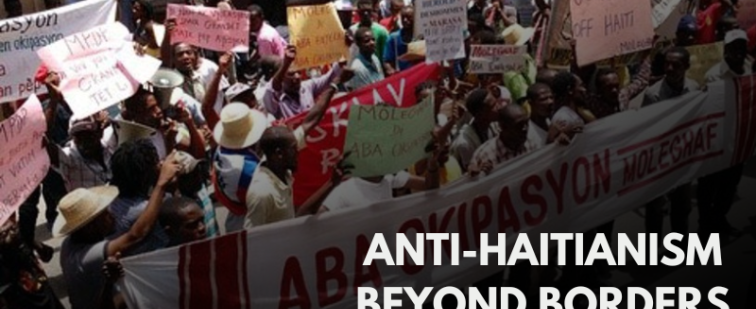Home
Traffick Jam
June 16, 2011
The ads that appeared in Drug Trade News, a pharmaceutical industry publication that existed from the 1920s through the 1970s, are striking today for their tone, tenor, racism, or maybe what could be described as devastating privilege. They reflect a U.S. drug industry that confidently presumed its dominant role in the global capitalist market in the 1960s, even as the world was rocked by popular rebellions.
Border Wars
June 14, 2011
On June 9, Alabama governor Robert Bentley signed into law what many see as the harshest anti-immigrant bill passed thus far by any U.S. state. H.B. (House Bill) 56, also known as the “Beason-Hammon Alabama Taxpayer and Citizen Protection Act,” exceeds Arizona’s infamous S.B. 1070 in its ambition. Failing federal intervention to block it, the bulk of the law is scheduled to go into effect on September 1.
Mexico, Bewildered and Contested
June 14, 2011
Last weekend, while in California, Mexico’s free-trading, conservative president, Felipe Calderón identified some of his principal political enemies: U.S. Arms Dealers, the Institutional Revolutionary Party (PRI) and Mexican pacifists. He named no names, but the identities were clear.
He was invited to Palo Alto to deliver Sunday’s commencement address at Stanford University. A portion of his speech included a sharp, campaign-style attack on Mexico’s once, but no longer dominant PRI.
Cuadernos Colombianos
June 13, 2011
State-sponsored crime is neither unique nor exceptional. In fact, as the prominent sociologist Charles Tilly pointed out, the history of the nation state has been violent. This violence has been harnessed over time to serve the interests of capital—as was the case of Europe.
Colombia is no exception.
Border Wars
June 11, 2011
On June 10, a new movement was born in Mexico. A peace caravan of hundreds of people from all over the country arrived to the border city of Ciudad Juárez to sign a national social pact with the goal of ending the militarized drug war in Mexico. This drug war has killed approximately 40,000 people since Mexican president Felipe Calderón took office in December 2006. This pact was appropriately signed in brutalized Ciudad Juárez, an epicenter of drug war-related violence, where 7,000 of these killings have taken place.
Rebel Currents
June 9, 2011
Last week Brazilian President Dilma Rousseff launched an ambitious program to eradicate extreme poverty by 2014. Under the “Brazil Without Poverty” initiative, the government will spend $12.5 billion a year to expand cash transfers and health, education, and job training services for some 16 million people (8.5% of Brazil’s population) with incomes of up to $44 per month, who have failed to benefit from Brazil’s rapidly expanding economy.
The announcement comes as Rousseff continues to be challenged, in the international spotlight, by conflicts that expose the high cost of economic progress borne by Brazil’s most impoverished and indigenous communities.
Border Wars
June 8, 2011
From May 30 to June 5, I participated in the Migrant Trail Walk, a 75 mile walk from the U.S.-Mexico border to Tucson, Arizona, traversing the Altar Valley, one of the hottest stretches in the Sonoran desert during the summer months. This eighth annual walk was done in solidarity with the thousands of migrants who cross into the United States clandestinely, and in remembrance of the thousands whose bodies have been recovered, many in the same vast desert where we walked.
Mexico, Bewildered and Contested
June 7, 2011
There are times in which the enforcement of the law may represent a step backward for the rule of law. Jorge Hank Rhon, a powerful figure in Mexico’s once-dominant Institutional Revolutionary Party (PRI), was arrested before dawn last Saturday for the possession of a sizable illegal arsenal in his home. He may not be one of the world's good guys, but the circumstances and timing of his arrest are suspicious.












